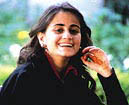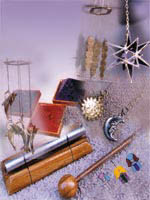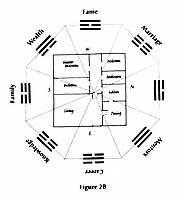- Home
- Archive -Nov 2000
- Feng shui yours. . .

Feng shui yourself
- In :
- Personal Growth
November 2000
By Ambica Gulati
Feng shui is not mere placement of articles; it is one of the personal growth tools to attune your life with your environment. And it is vying with vaastu shastra (the ancient Indian version of feng shui) in popularity stakes
TRY THIS
Feng Shui is also about spiritual development, says Ritu Kapoor. She suggests that:
shui works better for you if you are more attuned to the universe. Remove all the blockages from your mind and start afresh. Send good vibrations to all and sundry. Be true to yourself and connect with your higher self. If you hate someone, send love vibes to that person first thing in the morning. This works very well for people with relationship problems, more so in the case of unhappy marriages. Just visualize yourself throwing roses and smiles at that person, saying ‘I Love You’. For good luck and fortune, preferably cover your entrance with money plant.
 |
Rasika and Ravi Chadha suggest simple remedies:
1. At work, sit with your back to a solid wall. If you face open space you will be more in command of the situation.
2. The person cooking the food should also face open space. This is a source of energy. Food will be more nourishing, there will be harmony in the house and people will be less nervous.
3. Have prominent nameplates. Your identity is the first source of ch’i.
4. Don’t sleep on a box-bed. As most people fill it with clutter, it blocks ch’i. In case it is not possible to change your bed, take out the clutter and put bed sheets and quilts in it. Raise the bed by putting bricks under it to enable ch’i to circulate.
5. Play loud music at dusk for at least 10 minutes. With the setting sun the energies get low and loud music helps to boost energy levels.
 |
When I walked into feng shui expert Ritu Kapoor’s house in Delhi, I didn’t notice the cramped entrance. But what I did notice was the beautifully upholstered light blue sofa, the heavenly sky right inside a home. And what caught my attention at feng shui practitioner Ravi Chadha’s house entrance was an earthen fish flowerpot resting on three earthen feet.
How come the two had managed to light up small spaces? What they had done was make a subtle shift in the ch’i (universal energy), so as to eliminate shar ch’i(negative energy). That’s what feng shui (pronounced foong shway) is all about—create sheng ch’i (positive energy) to balance man and nature. When it is present, everything goes exactly the way you want it to. Something that vaastu shastra also does.
From an unknown art in India, feng shui of Chinese origin, is today gaining popularity as a personal growth tool, equivalent to vaastu. What makes it so widely accepted? ‘Because feng shui is more flexible than vaastu,’ says Ritu. Adds Chadha: ‘In 95 per cent of the cases, there is no need for demolition or reconstruction. The beauty of feng shui is that it incorporates minor changes, which make major changes in your life.’
Let’s see how Ritu and Chadha created ch’i. Shar ch’i is created by straight lines or angles directly pointing towards your house. This was the case in both houses. To create ch’i, Ritu hung a few Chinese coins in gold and black metal with a red thread on her main door, put plants on the cabinet, and a metal sculpture on the other side. And the moment you entered, your eyes fell on the aum(the sacred Hindu sound of creation) engraved in gold, studded with gems and a red cloth hung over it. Chadha had detracted the shar ch’i with the fish pot.
As far back as 5, 000 years, the Chinese discovered that if their homes faced south with the hills behind them and gentle flowing water in front, people living in them led happy, contented lives. In fact, the word feng shui means wind and water. Cold, harsh winds came from the north and hills in this direction protected them from the chill. Flowing water allowed the crops to grow and created ch’i.
So, ideally homes should be in the hills, but since this is not possible in today’s world, feng shui has the flexibility to accommodate most changes in your present homes. Rasika, Chadha’s daughter who works with him as a feng shui consultant, got one of the entrance walls painted in silver and blue to give the effect of running water. They’ve hung a picture of a waterfall over it to make opportunities flow their way in life. Right beneath that is the leaping frog, symbolic of leaping ahead in life.
According to another legend, feng shui originated with a tortoise. During irrigation in the Yellow River ordered by Wu, one of the five mythical emperors ruling China in prehistoric times, a giant tortoise crawled out of the river. It was widely believed that the gods resided in this sea creature, even Hindus claim tortoise to be one of the nine avatars of Lord Vishnu. On looking closely, Wu found a three-by-three magic square on its shell. Each horizontal and vertical row added up to 15.
Through the magical square, the pa kua (pronounced bagua) was developed. This has nine squares representing the different areas in life—wealth, fame, marriage, family and health, good luck, children, knowledge, career and mentors and travel. To facilitate matters, Patiala-based Sanjay Gupta of India has developed a feng shui compass out of this pa kua and has authored The Practical Remedies: Vaastu Shastra & Feng Shui.
‘Feng shui is individual specific. Besides the pa kua, we also have to check out other factors,’ says Rasika. Your animal sign, based on the year of birth according to Chinese astrology, will show specific traits—both physically and in your personality—which relate to one particular element. The elements are wood, fire, metal, earth and water.
Write Park-Tin Li and Helen Yeap in Change Your Life with Feng Shui (published by Health Harmony): ‘Different elements interact positively or negatively with each other. In feng shui the compatibility cycle is based on a free-flowing circular movement, linking the elements in a positive combination of energies.’ They give the compatibility cycle as: wood feeds fire, which creates earth, earth is the cradle of ore and the creator of metal and metal in its molten form is solidified and finds its strength in water, which feeds the roots of trees and is the heart of wood.
 |
The authors also show the incompatibility cycle: wood through its roots drives stakes into the earth, which smothers and consumes water. Fire corrodes metal and metal cuts wood.
To enhance or depress certain areas, feng shui offers nine kinds of cures. One is the use of bright objects such as mirrors, lights and crystals. Dr Rachna Khanna, homeopath and feng shui and energy healing accessories retailer in Delhi, put a pa kua mirror on the wall just above her bathroom door so that the wealth wouldn’t keep flowing out.
Then there are living objects such as aquariums and flowers. In case of their non-availability, you can use ceramic animals or earthenware. Ritu recounts how her career in feng shui started with an aquarium she had bought for her son’s birthday three years back. ‘By chance, I put it in the career corner of the room and today feng shui is a way of life.’ By far, flowers are the most commonly used cure. Now we know why flowers have remained an excellent gift down the ages in different cultures.
Third comes sound, which can be created with wind chimes and bells. No wonder a temple has so many bells—to enhance ch’i. Says Rachna: ‘There was constant sickness in a family friend’s home. On checking we found that they had a spiral staircase in the center of their house. So I advised them to put a wind chime there, which certainly improved the situation.’
Another common cure is moving objects such as fountains. Then heavy objects such as stones, boulders and statues also provide a remedy. For instance, Rasika has put crystals in her metal corner. Ritu has put black stone in her career corner. In fact, in the east corner of her drawing room, you find a live turtle in a blue bowl with a black stone to ‘sunbathe’ on. Cool feng shui cure!
Sometimes, feng shui experts recommend hollow objects such as flutes. Colors too are an important aspect and are used in co-ordination with the five elements. Even electrical appliances such as stereos, radios and TV sets have to be kept in a specific place. Above all this, feng shui experts rely heavily on intuition.
Both Ritu and Rasika showed me around their drawing rooms. The east corner had crystals and earthen idols of Ganesha(Hindu God of success) or Lakshmi (Hindu Goddess of wealth). Ritu had beautiful sandalwood idols with all the nine incarnations of Lord Vishnu. But this was all Indian! What about the Chinese articles—hamsas, wind chimes, bells? ‘We have to attune to our environment. I’ve used a lot of Chinese articles in my house, but I feel that we vibe best with our culture,’ elucidates Ritu. In the fame corner of her drawing room, she has hung a hamsa, put a sun painted in gold, embedded with emeralds to circulate ch’i. Chadha has even gone on to put a wood dragon in his wood corner. ‘People here consider the dragon to be a ferocious animal. But in China the dragon is revered as it is considered powerful enough to take all negativity, like our Ganesha,’ he says.
Both stress the importance of feng shui as a personal growth tool. ‘Feng shui is more than just placement of articles in the house. It is connected to your entire well-being,’ says Chadha. In fact, Rachna has been using feng shui along with homeopathy to treat patients. She cites the case of a 24-year old tobacco addict who was disappointed in love. ‘I asked him to light camphor lamps regularly, and he is much better now.’ The camphor lamp takes away your negativity by collecting negative energy in the form of carbon.
Explains Chadha: ‘Feng shui affects us at the physical, mental, emotional and finally the spiritual level.’ At the physical level, it relates to the changing of objects, or making interior changes. ‘Then of course, once you are stabilized mentally you can progress emotionally. Finally once the emotional balance is created, one evolves to the higher self.’ Chadha stresses the need to change your attitude along with the placing of the objects. ‘Feng shui can’t change your destiny, you also have to perform certain karma to evolve,’ says Ritu. ‘Simply by facing east, you can’t progress, hard work is equally important.’
So, why not try to grow the feng shui way?
To read more such articles on personal growth, inspirations and positivity, subscribe to our digital magazine at subscribe here
Life Positive follows a stringent review publishing mechanism. Every review received undergoes -
- 1. A mobile number and email ID verification check
- 2. Analysis by our seeker happiness team to double check for authenticity
- 3. Cross-checking, if required, by speaking to the seeker posting the review
Only after we're satisfied about the authenticity of a review is it allowed to go live on our website
Our award winning customer care team is available from 9 a.m to 9 p.m everyday
The Life Positive seal of trust implies:-
-
Standards guarantee:
All our healers and therapists undergo training and/or certification from authorized bodies before becoming professionals. They have a minimum professional experience of one year
-
Genuineness guarantee:
All our healers and therapists are genuinely passionate about doing service. They do their very best to help seekers (patients) live better lives.
-
Payment security:
All payments made to our healers are secure up to the point wherein if any session is paid for, it will be honoured dutifully and delivered promptly
-
Anonymity guarantee:
Every seekers (patients) details will always remain 100% confidential and will never be disclosed
